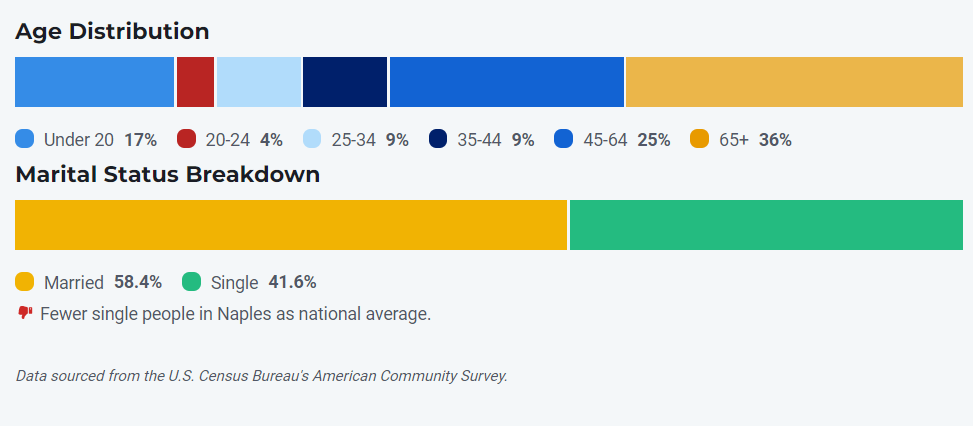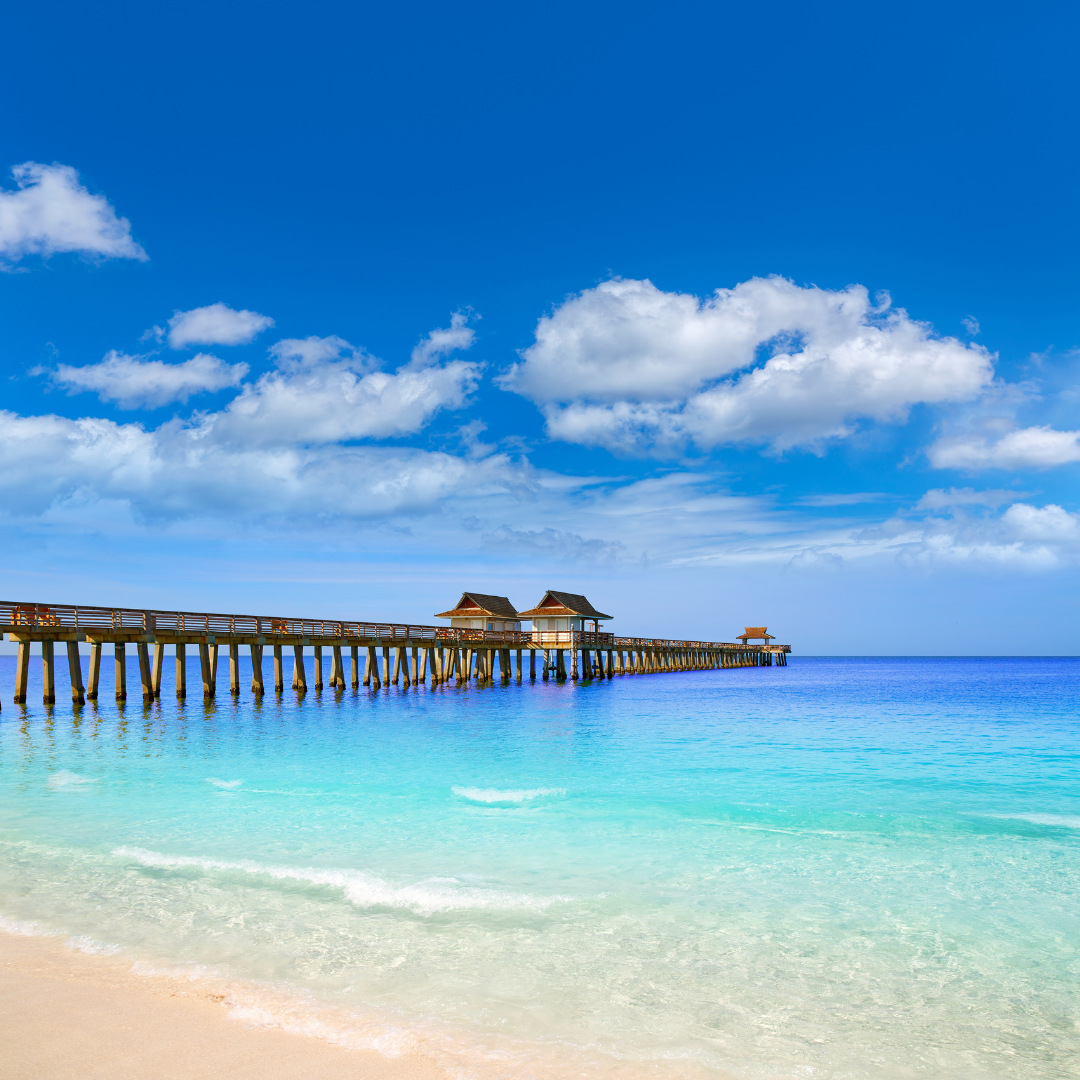It is always fun to be nationally recognized for what most of us Locals, already know! We are the least surprised about this, but it is a great reminder about this fabulous place so many of us call home – or second home!!
What’s it like to live in Naples, FL?
Nestled between the edges of the Everglades and the shores of the Gulf of Mexico sits Collier County, home to Naples, Immokalee and Marco Island, as well as a range of distinctly Florida flavors.
Long known as a preferred retirement or vacation home spot for the rich, powerful and cold-averse, the greater Naples area supplies pristine beaches, sprawling golf courses, and fine dining and shopping. Closer to the area’s rural interior, meanwhile, cattle graze and seasonal workers pick tomatoes in the fields around Immokalee, a farming community an hour’s drive outside of Naples.

What is there to do in Naples, FL?
A tropical playground for the powerful and wealthy, Naples primarily caters to an older demographic of retirees and snowbirds. But the area is also home to a growing craft brewery scene and pockets of dive bars, clubs and waterside establishments.
Sugary beaches are the main draw for many, although red tide – the bloom of toxin-producing algae that can kill fish and cause respiratory issues and skin irritation in humans – can at times put a damper on the fun in the sun. The area’s shores, backwaters and bays are also popular among boaters and anglers.
A perk for local beachgoers is that with a Collier County address, residents can receive a free sticker that allows them to bypass beach parking charges. With proof of residency – a current Collier County driver’s license and vehicle registration – locals can pick up the permit at any community center.
What’s the cost of living in Naples, FL?
As is the case in much of the country, residents in Collier County can expect to pay a premium if they want to live closer to the urban coast, especially in wealthy cities like Naples and Marco Island. Closer to the area’s rural interior, meanwhile, the cost of living drops.
With generally high property values, local municipalities in the area largely rely on property taxes as a primary revenue source. Those taxes vary depending on whether residents live in the county’s two cities, Naples and Marco Island, or Collier’s unincorporated area.
Florida does not have a state income tax. And in Naples, like elsewhere in the state, residents can take advantage of a so-called homestead exemption. If someone owns property and makes it his or her permanent residence or the permanent home of his or her dependent, the property owner may be eligible to receive an exemption that would decrease the property’s taxable value.
How we calculate this »
Naples offers a lower value than similarly sized metro areas when you compare housing costs to median household income.
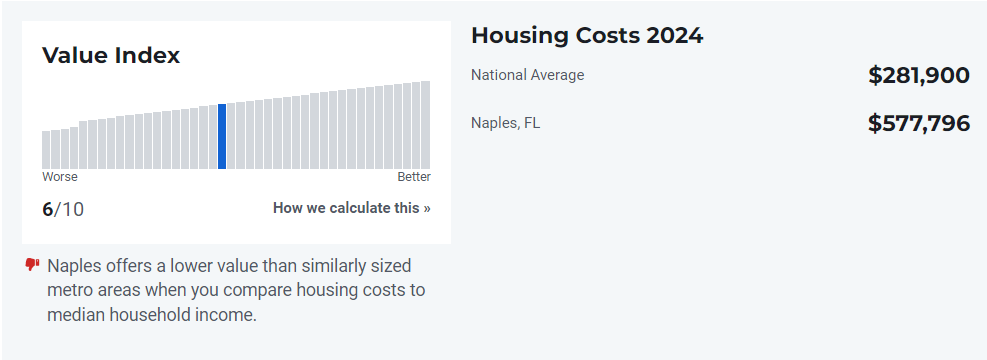
What’s the weather like in Naples, FL?
Naples draws sun-hungry tourists and snowbirds in the drier, cooler winter months.
But there is a reason most seasonal residents leave the area as summer approaches. During the hotter months – also known as the rainy season – humidity spikes, showers occur daily and high temperatures bake sidewalks and steering wheels.
Like much of the state, the Naples area is no stranger to devastating hurricanes. The Atlantic hurricane season runs from June 1 to Nov. 30. For residents, that means a yearly ritual of stocking up on canned goods, water and batteries and keeping a close eye on any storms that may form and the path they may take.
In 2017, Hurricane Irma, a powerful Category 3 storm, made landfall on Marco Island, packing strong winds and bringing with it destructive storm surges. Although the extent of the damage in Naples was mostly confined to trees being uprooted, residents in more rural areas continued to struggle to recover months after the storm had passed.
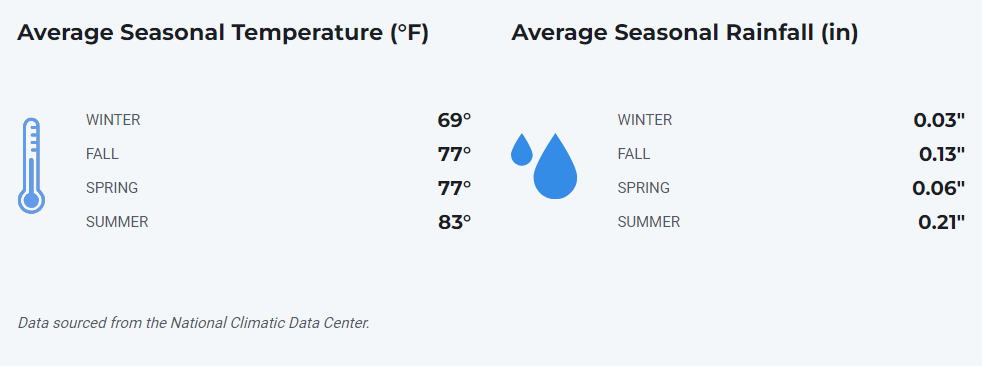
What’s the best way to get around Naples, FL?
Because Collier County covers a lot of ground and Naples is somewhat spread out, most residents use cars to get around.
In season, roads quickly become clogged, especially during rush hour or when residents and visitors are trying to flock to the beach. Parking often fills up quickly, especially at the region’s more popular beaches. Many workers commute from neighboring Lee County into Collier County, which can cause long delays during rush hour.
Although there is public transit in the form of the CAT (Collier Area Transit) bus system, ridership has been declining for years. Due to the favorable weather, cyclists are a common sight on some of the area’s quieter roads, especially during the winter months.
To reach the area by air, most travelers fly into Southwest Florida International Airport near Fort Myers. But Fort Lauderdale and Miami airports are under 2 hours away.
Although pockets lend themselves to walking from one place to the next – like Fifth Avenue South, Naples’ tony downtown main street – most of the area is not very pedestrian-friendly due to the sprawling nature of development and the long distances between points of interest.
Commuting in Naples, FL
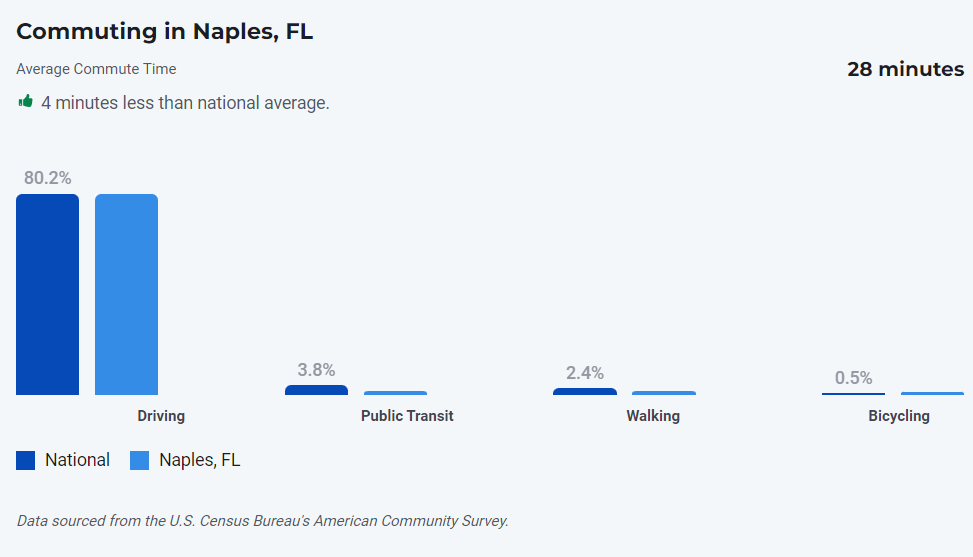
Who lives in Naples, FL?
Collier County – and with it Naples and Marco Island – have long been desired retirement spots and continue to draw seniors looking to enjoy the area’s warm weather, beaches and neatly manicured golf courses.
Although the demographics skew older, nearby Florida Gulf Coast University – located in neighboring Lee County – and Florida SouthWestern State College – a public college with a campus near Naples – help to infuse some youth.
